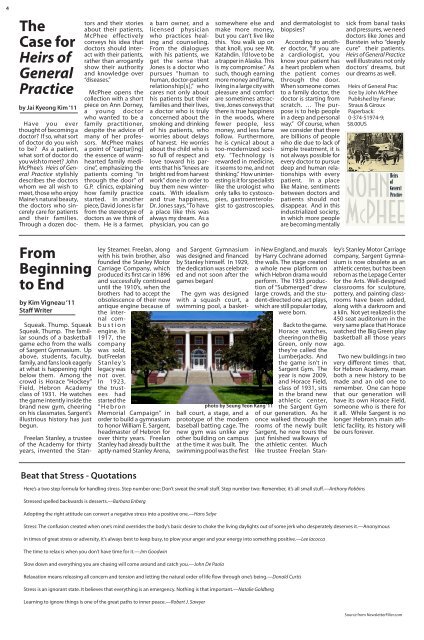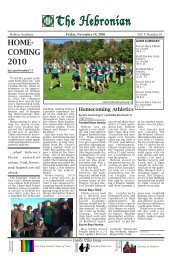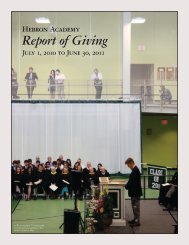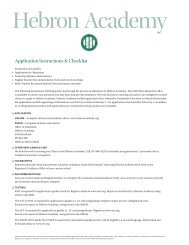Here's - Hebron Academy
Here's - Hebron Academy
Here's - Hebron Academy
Create successful ePaper yourself
Turn your PDF publications into a flip-book with our unique Google optimized e-Paper software.
4<br />
The<br />
Case for<br />
Heirs of<br />
General<br />
Practice<br />
by Jai Kyeong Kim ‘11<br />
Have you ever<br />
thought of becoming a<br />
doctor? If so, what sort<br />
of doctor do you wish<br />
to be? As a patient,<br />
what sort of doctor do<br />
you wish to meet? John<br />
McPhee’s Heirs of General<br />
Practice stylishly<br />
describes the doctors<br />
whom we all wish to<br />
meet, those who enjoy<br />
Maine’s natural beauty,<br />
the doctors who sincerely<br />
care for patients<br />
and their families.<br />
Through a dozen doctors<br />
and their stories<br />
about their patients,<br />
McPhee effectively<br />
conveys his idea that<br />
doctors should interact<br />
with their patients,<br />
rather than arrogantly<br />
show their authority<br />
and knowledge over<br />
“diseases.”<br />
McPhee opens the<br />
collection with a short<br />
piece on Ann Dorney,<br />
a young doctor<br />
who wanted to be a<br />
family practitioner,<br />
despite the advice of<br />
many of her professors.<br />
McPhee makes<br />
a point of “captur[ing]<br />
the essence of warmhearted<br />
family medicine”,<br />
emphasizing the<br />
patients coming “in<br />
through the door” of<br />
G.P. clinics, explaining<br />
how family practice<br />
started. In another<br />
piece, David Jones is far<br />
from the stereotype of<br />
doctors as we think of<br />
them. He is a farmer,<br />
a barn owner, and a<br />
licensed physician<br />
who practices healing<br />
and counseling.<br />
From the dialogues<br />
with his patients, we<br />
get the sense that<br />
Jones is a doctor who<br />
pursues “human to<br />
human, doctor-patient<br />
relationship[s],” who<br />
cares not only about<br />
his patients but their<br />
families and their lives,<br />
a doctor who is truly<br />
concerned about the<br />
smoking and drinking<br />
of his patients, who<br />
worries about delays<br />
of harvest. He worries<br />
about the child who is<br />
so full of respect and<br />
love toward his parents<br />
that his “knees are<br />
bright red from harvest<br />
work” done in order to<br />
buy them new wintercoats.<br />
With idealism<br />
and true happiness,<br />
Dr. Jones says, “To have<br />
a place like this was<br />
always my dream. As a<br />
physician, you can go<br />
somewhere else and<br />
make more money,<br />
but you can’t live like<br />
this. You walk up on<br />
that knoll, you see Mt.<br />
Katahdin. I’d love to be<br />
a trapper in Alaska. This<br />
is my compromise.” As<br />
such, though earning<br />
more money and fame,<br />
living in a large city with<br />
pleasure and comfort<br />
are sometimes attractive,<br />
Jones conveys that<br />
there is true happiness<br />
in the woods, where<br />
fewer people, less<br />
money, and less fame<br />
follow. Furthermore,<br />
he is cynical about a<br />
too-modernized society.<br />
“Technology is<br />
rewarded in medicine,<br />
it seems to me, and not<br />
thinking.” How uninteresting<br />
is it for specialists<br />
like the urologist who<br />
only talks to cystoscopies,<br />
gastroenterologist<br />
to gastroscopies,<br />
and dermatologist to<br />
biopsies?<br />
According to another<br />
doctor, “If you are<br />
a cardiologist, you<br />
know your patient has<br />
a heart problem when<br />
the patient comes<br />
through the door.<br />
When someone comes<br />
to a family doctor, the<br />
doctor is starting from<br />
scratch. … The purpose<br />
is to help people<br />
in a deep and personal<br />
way.” Of course, when<br />
we consider that there<br />
are billions of people<br />
who die due to lack of<br />
simple treatment, it is<br />
not always possible for<br />
every doctor to pursue<br />
deep and human relationships<br />
with every<br />
patient. In a place<br />
like Maine, sentiments<br />
between doctors and<br />
patients should not<br />
disappear. And in this<br />
industrialized society,<br />
in which more people<br />
are becoming mentally<br />
sick from banal tasks<br />
and pressures, we need<br />
doctors like Jones and<br />
Burstein who “deeply<br />
cure” their patients.<br />
Heirs of General Practice<br />
well illustrates not only<br />
doctors’ dreams, but<br />
our dreams as well.<br />
Heirs of General Prac<br />
tice by John McPhee<br />
Published by Farrar;<br />
Straus & Giroux<br />
Paperback:<br />
0-374-51974-9;<br />
$8.00US<br />
From<br />
Beginning<br />
to End<br />
by Kim Vigneau ‘11<br />
Staff Writer<br />
Squeak. Thump. Squeak<br />
Squeak. Thump. The familiar<br />
sounds of a basketball<br />
game echo from the walls<br />
of Sargent Gymnasium. Up<br />
above, students, faculty,<br />
family, and fans look eagerly<br />
at what is happening right<br />
below them. Among the<br />
crowd is Horace “Hockey”<br />
Field, <strong>Hebron</strong> <strong>Academy</strong><br />
class of 1931. He watches<br />
the game intently inside the<br />
brand new gym, cheering<br />
on his classmates. Sargent’s<br />
illustrious history has just<br />
begun.<br />
Freelan Stanley, a trustee<br />
of the <strong>Academy</strong> for thirty<br />
years, invented the Stanley<br />
Steamer. Freelan, along<br />
with his twin brother, also<br />
founded the Stanley Motor<br />
Carriage Company, which<br />
produced its first car in 1896<br />
and successfully continued<br />
until the 1910’s, when the<br />
brothers had to accept the<br />
obsolescence of their now<br />
antique engine because of<br />
the internal<br />
combustion<br />
engine. In<br />
1917, the<br />
company<br />
was sold,<br />
but Freelan<br />
Stanley’s<br />
legacy was<br />
not over.<br />
In 1923,<br />
the trustees<br />
had<br />
started the<br />
“<strong>Hebron</strong><br />
Memorial Campaign” in<br />
order to build a gymnasium<br />
to honor William E. Sargent,<br />
headmaster of <strong>Hebron</strong> for<br />
over thirty years. Freelan<br />
Stanley had already built the<br />
aptly-named Stanley Arena,<br />
and Sargent Gymnasium<br />
was designed and financed<br />
by Stanley himself. In 1929,<br />
the dedication was celebrated<br />
and not soon after the<br />
games began!<br />
photo by Seung Yeon Kang ‘11<br />
The gym was designed<br />
with a squash court, a<br />
swimming pool, a basketball<br />
court, a stage, and a<br />
prototype of the modern<br />
baseball batting cage. The<br />
new gym was unlike any<br />
other building on campus<br />
at the time it was built. The<br />
swimming pool was the first<br />
in New England, and murals<br />
by Harry Cochrane adorned<br />
the walls. The stage created<br />
a whole new platform on<br />
which <strong>Hebron</strong> drama would<br />
perform. The 1933 production<br />
of “Submerged” drew<br />
large crowds, and the student-directed<br />
one act plays,<br />
which are still popular today,<br />
were born.<br />
Back to the game.<br />
Horace watches,<br />
cheering on the Big<br />
Green, only now<br />
they’re called the<br />
Lumberjacks. And<br />
the game isn’t in<br />
Sargent Gym. The<br />
year is now 2009,<br />
and Horace Field,<br />
class of 1931, sits<br />
in the brand new<br />
athletic center,<br />
the Sargent Gym<br />
of our generation. As he<br />
once walked through the<br />
rooms of the newly built<br />
Sargent, he now tours the<br />
just finished walkways of<br />
the athletic center. Much<br />
like trustee Freelan Stanley’s<br />
Stanley Motor Carriage<br />
company, Sargent Gymnasium<br />
is now obsolete as an<br />
athletic center, but has been<br />
reborn as the Lepage Center<br />
for the Arts. Well-designed<br />
classrooms for sculpture,<br />
pottery, and painting classrooms<br />
have been added,<br />
along with a darkroom and<br />
a kiln. Not yet realized is the<br />
450 seat auditorium in the<br />
very same place that Horace<br />
watched the Big Green play<br />
basketball all those years<br />
ago.<br />
Two new buildings in two<br />
very different times that,<br />
for <strong>Hebron</strong> <strong>Academy</strong>, mean<br />
both a new history to be<br />
made and an old one to<br />
remember. One can hope<br />
that our generation will<br />
have its own Horace Field,<br />
someone who is there for<br />
it all. While Sargent is no<br />
longer <strong>Hebron</strong>’s main athletic<br />
facility, its history will<br />
be ours forever.<br />
Beat that Stress - Quotations<br />
Here’s a two step formula for handling stress. Step number one: Don’t sweat the small stuff. Step number two: Remember, it’s all small stuff.—Anthony Robbins<br />
Stressed spelled backwards is desserts.—Barbara Enberg<br />
Adopting the right attitude can convert a negative stress into a positive one.—Hans Selye<br />
Stress: The confusion created when one’s mind overrides the body’s basic desire to choke the living daylights out of some jerk who desperately deserves it.—Anonymous<br />
In times of great stress or adversity, it’s always best to keep busy, to plow your anger and your energy into something positive.—Lee Iacocca<br />
The time to relax is when you don’t have time for it.—Jim Goodwin<br />
Slow down and everything you are chasing will come around and catch you.—John De Paola<br />
Relaxation means releasing all concern and tension and letting the natural order of life flow through one’s being.—Donald Curtis<br />
Stress is an ignorant state. It believes that everything is an emergency. Nothing is that important.—Natalie Goldberg<br />
Learning to ignore things is one of the great paths to inner peace.—Robert J. Sawyer<br />
Source from NewsletterFiller.com










